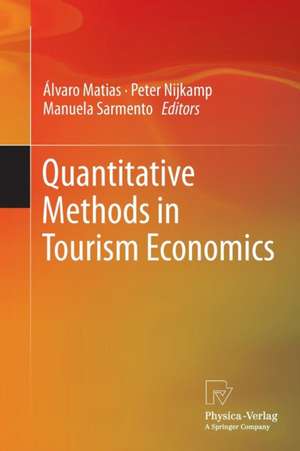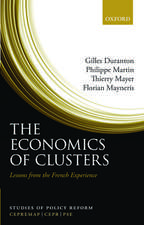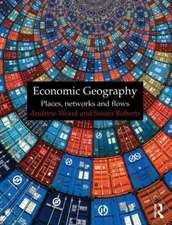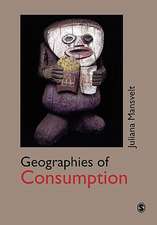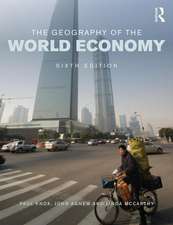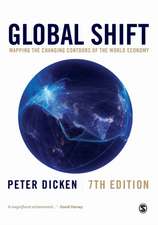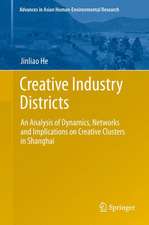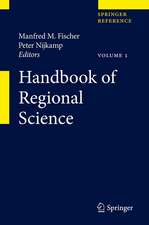Quantitative Methods in Tourism Economics
Editat de Álvaro Matias, Peter Nijkamp, Manuela Sarmentoen Limba Engleză Paperback – 29 ian 2015
| Toate formatele și edițiile | Preț | Express |
|---|---|---|
| Paperback (1) | 947.67 lei 6-8 săpt. | |
| Physica-Verlag HD – 29 ian 2015 | 947.67 lei 6-8 săpt. | |
| Hardback (1) | 953.65 lei 6-8 săpt. | |
| Physica-Verlag HD – 14 dec 2012 | 953.65 lei 6-8 săpt. |
Preț: 947.67 lei
Preț vechi: 1155.69 lei
-18% Nou
Puncte Express: 1422
Preț estimativ în valută:
181.36€ • 188.64$ • 149.72£
181.36€ • 188.64$ • 149.72£
Carte tipărită la comandă
Livrare economică 14-28 aprilie
Preluare comenzi: 021 569.72.76
Specificații
ISBN-13: 9783790829266
ISBN-10: 3790829269
Pagini: 360
Ilustrații: VIII, 352 p.
Dimensiuni: 155 x 235 x 19 mm
Greutate: 0.51 kg
Ediția:2013
Editura: Physica-Verlag HD
Colecția Physica
Locul publicării:Heidelberg, Germany
ISBN-10: 3790829269
Pagini: 360
Ilustrații: VIII, 352 p.
Dimensiuni: 155 x 235 x 19 mm
Greutate: 0.51 kg
Ediția:2013
Editura: Physica-Verlag HD
Colecția Physica
Locul publicării:Heidelberg, Germany
Public țintă
ResearchCuprins
Editorial Introduction.- Behavioral Issues: Loyalty Measurement in Tourism.- Tourists Return Intentions.- Evaluation of the Interrailers’ Satisfaction Regarding the Tourism Services and Activities in Italy, Greece and Croatia.- Forecasting Tourism Demand for South Africa Using a Single Equation Causal Approach.- The Importance of ICT for Tourism Demand.- Migration and Tourism Flows in New Zealand.- Supply of Tourist Amenities: How to Create a New Holiday Destination?- The Economic Impact of Social Tourism Programmes.- Cultural Festivals and Regional Economic Development.- Assessing the Spatial and Environmental Characteristics of Rural Tourism Lodging Units Using a Geographical Weighted Regression Model.- Yield Revenue Management in the Hotel Sector.- Macro and Sustainability Issues: Tourism Growth versus Economic Development.- Gender, Wages, and Productivity.- Territorial Differentiation, Competitiveness and Sustainability of Tourism.- Did the Financial Crisis and Policy Deregulation for Chinese Tourists Affect the Efficiency and Output Slacks of Taiwanese Hotels?- Institutional Analysis of Environmental Management Practices.- Market Segmentation in Tourism.
Textul de pe ultima copertă
Tourism economics is partly based on established principles from the economics discipline, but it also incorporates elements from sociology, psychology, organization theory and ecology. It has over the years turned into an appealing multi-disciplinary oriented approach to the understanding of the impacts of leisure time in a modern society, including cultural heritage, sustainable quality of life, and industrial organization of the hospitality industry. The increasing dynamics in the tourist industry and its worldwide effects will continue to attract the attention of both the research and the policy sector in the years to come. Rather than speculating on non-observed facts, there is a clear need for evidence-based research in order to map out the complex dynamics of the tourist industry. The present volume comprises novel studies – mainly of a quantitative-analytical nature – on the supply, demand and contextual aspects of modern tourism. It contains a sound mix of theory, methodology, policy and case studies on various tourism issues in different parts of the world.
Caracteristici
Provides an in depth oversight on the latest research contributions in the field Written by high academic scholars Includes theoretical and applied original studies on tourism quantitative methods Includes empirical analysis and impact assessment of tourism activities Includes supplementary material: sn.pub/extras
